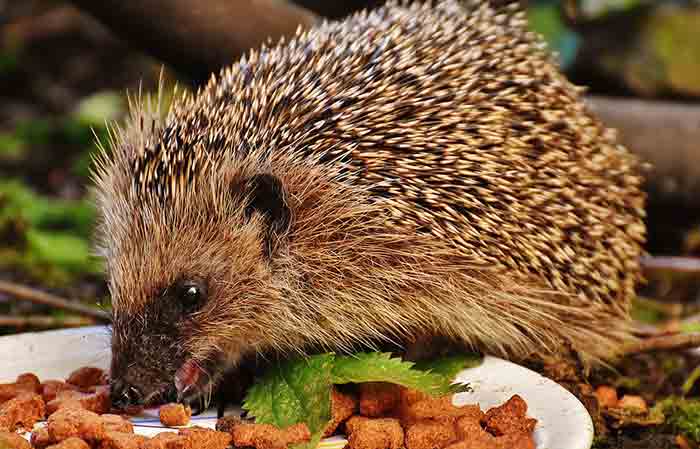There are four species of domesticated hedgehogs. From the Algerian hedgehog, the four-toed hedgehog, the Egyptian long-eared hedgehog, and the Indian long-eared hedgehog. The most prevalent species is the four-toed hedgehog also known as the African pygmy hedgehog (Atelerix albiventris).
This specific breed lives an average life of two to three years with a possibility of longer if taken care of. Just like any other pet, with safety, food, good living conditions, and good health; the hedgehog can live up to double the average lifespan.
How Long Do They Live?
For all animals, there are two scenarios whereby you can look into their livelihood; in the wild vs in captivity.
Hedgehogs that aren’t domesticated risk death by injury, poachers, and extreme weather conditions. Hence, they have a reduced lifespan of only two to three years.
However, the years could be elongated when the pygmy hedgehog is taken into captivity. They could live up to six or seven years as your family pet away from predators.

Factors That Will Determine the Lifespan
To ensure your hedgehog lives the longest life possible, there are certain elements that could affect that outcome.
Genetics
The type of breed you purchase should have a high life expectancy. As the owner, you have the choice of which breed you want to take home with you.
Therefore, do some research on the breeder, ask on forums online, or inquire from the pet store you’ll be purchasing the pet.
Select a good breed that’s strong and healthy, not prone to health issues, or have congenital birth defects. This factor should play the first hand in ensuring you’re getting your money’s worth.
Nonetheless, don’t be mistaken, the hedgehog can live less or longer regardless of their breed. Therefore, don’t let this be the main factor.
Living Conditions
A safe, secure, and comfortable habitat is equally essential. Get a large wired cage measuring four feet tall and two feet wide with a solid base to offer feet support. The cage can be customized to its needs to include adding levels to allow for jumping. You can also add the cages to offer the hedgehog more space to play.
Temperature control is also vital for African pygmy. Avoid putting its cage next to temperature-driven areas such as close to windows, heaters, fireplaces, air conditioners, or the door. Maintain a temperature of between 75 – 80 °F and place the cage where the hedgehog can experience day and night, even though they’re nocturnal.
Other things you could look into are;
- Soft bedding rather than wood shavings
- Add a hide area like a box or igloo where the hedgehog can hide for safety.
- Add toys to enrich the hedgehog. Try tunnels, ramps, ledges, PVC pipes, and tubing, chew toys, and balls.
- A playpen for additional space to play.
Food and Dietary Needs
Yet another crucial factor that can tremendously affect the lifespan of your hedgehog. Pet pygmy enjoy plenty of foods such as beans, meat, chicken, fruits, and vegetables like peas, insects like mealworms, and crickets, among other foods.
The trick is to have two bowls; for dry foods and moist foods. Get the hedgehog as much protein content as you can to keep it strong and energized. Canned dog food will also be an excellent choice for moist foods. The pet will enjoy treats of insects since primarily hedgehogs are insectivores. Therefore, get a pack of either live or dried insects and reward the hedgehog.
Last but not least, water. A source of cleaning water is very vital to its health. Keeping the hedgehog hydrated is as easy as adding a stoppered bottle to its cage and let it indulge in it as much as it’ll like.
Health Concerns
A pet’s health can easily deteriorate and before you know it, it’s gone. You don’t want that to happen to you. Hedgehogs can get numerous health issues including dental disease, skin problems from an infestation of mite and live, tumors, among other health concerns.
Once in a while, the hedgehog has to be sprayed and neutered to protect its internal organs, especially the reproductive system from tumors and diseases. Annual checkups are also recommended for teeth cleaning and prevention of dental problems.
Finally, the spine issue. The hedgehog will lose a few spines here and there and it’s common. However, when the number rapidly increases, that’s a medical concern as it more often than not signifies your pet has parasitic infestations and you need to visit the vet as soon as possible.
Overall Care
The overall wellbeing of your pet is also very important. The happier your hedgehog is, the healthier it will be, hence longer life. Here are some tips to ensure the pet is as comfortable as it can be.
- Try to get the hedgehog to be as comfortable as they can with you. Spend quality time with it by playing, bathing/ cleaning it up, and so forth.
- Clean its cage every so often as you empty the litter box and food bowls daily.
- Change the bedding weekly
- Bathe the pet every so often particularly its quills where dirt and debris are easily lodged. Ensure the pet is completely dry before you place it back in its cage after a shower.
- Trim their long, sharp, and dirty nails as much as you can. Use human nail clippers as the nails aren’t as hard as those of a rabbit.
Maintaining the pet isn’t a hard task. Most especially for the hedgehog, they are naturally clean animals that don’t need constant bathing nor checking in on them every so often. With the four points above, you have provided the pet with all the essentials needs it requires to thrive.
More about Hedgehogs






